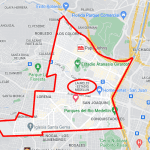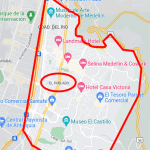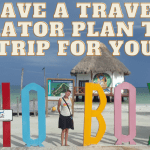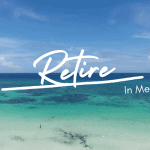Do’s and Don’ts When Starting Your New Nomad Lifestyle
Table of Contents

Living a nomad life is completely different from the traditional 9-5 lifestyle and definitely takes an adjustment period. Without a little research and a lot of planning, your nomad journey might end sooner than you like. We want to help you escape the rat race – that’s why we’ve compiled this list of do’s and don’ts for starting your new nomad lifestyle.
Of course, every scenario is unique and some of these do’s and don’ts won’t be applicable to your specific circumstances. However, we’ve been living the nomad lifestyle long enough to know what will and won’t work in a general sense.
Before we get into the things you’ll likely want to avoid, we’ll start with some ideas on how you can start your nomadic lifestyle on the right foot.
Tips for Starting Your Nomad Lifestyle on the Right Foot
Let’s face it – Most of us don’t have unlimited funds for living in the lap of luxury long term. But the good news is, your dollar will generally go a lot further once you’re living abroad. An adventure-filled nomad lifestyle is possible even with a limited budget.
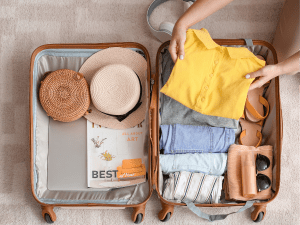
We’re going to take a look at a few ways we’ve saved money on travel in hopes to help others do the same. Feel free to cherry pick the options that sound the most appealing to you!
#1 Do: Save Money on Accommodations
Living in a hotel room isn’t a realistic expectation when you’re starting a fully nomadic lifestyle. Even with the cheaper accommodations you’ll find abroad, the cost of living would be exorbitant. Aside from that, you’ll probably start to miss having certain home amenities like a kitchen after a while.
Unfortunately, most people don’t realize how many options they truly have.
We’ll go over a few options for ways you can save on “long-term” housing. Remember, living a nomadic lifestyle means you’re probably going to be, at least somewhat, well… nomadic. So, when we say “long-term” housing, we’re talking months rather than years.
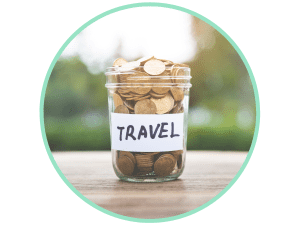
We find ourselves moving pretty regularly. And while our itchy feet can take us to some potentially great locations, we often don’t know if we’re going to jive with a place until we get there. We regularly use the following accommodation options to get the lay of the land for 1-3 months before committing to a place for a longer period of time.
Starting Your Nomad Lifestyle: House & Pet Sitting
We’re not going to take a deep dive into house and pet sitting here. However, it can be a great option for people who want to explore new locations on a budget. It’s exactly what it sounds like. You exchange your time caring for a home and/or pets for free accommodation.
This can be a great way to check out an area of interest without breaking the bank. Sits can range from a weekend to several months or more! Individuals, couples, and even families with pets can typically find a house or pet sit if they’re flexible.
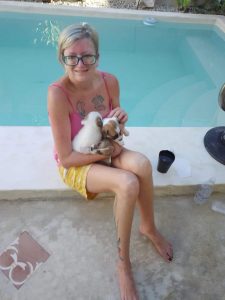
We’ve had some really great experiences with house and pet sitting. But, we’ve also had some not-so-great sits. Always be clear about expectations, and make sure any home/pet sitting opportunity is a good fit for all parties involved.
Note: No money should ever exchange hands for house and pet sitting.
Starting Your Nomad Lifestyle: Volunteer Your Services
Many hotels, hostels, and even resorts often offer free (or discounted) accommodations for individuals or couples willing to volunteer a few hours of their time per week. We’ve helped in kitchens, bars, and reception desks across Central and South America.

A lot of times, our hospitality backgrounds had nothing to do with us getting a volunteer gig. If you don’t think you’re “qualified” to volunteer your services, you might be totally wrong. Oftentimes, you’ll be considered an asset if you speak English and don’t mind conversing with fellow travelers staying at said hostel, hotel, or resort.
In general, volunteer opportunities don’t include pay. And if they do, it won’t be much. Instead, some perks you can typically expect include;
- Private or Shared Accommodation
- Use of Facilities
- Meals (Usually breakfast)
- Discounted Tours/Transportation
Be sure to ask “what’s included” as well as “what’s expected” when discussing potential volunteer situations. Doing your due diligence before committing will go a long way towards ensuring all parties involved are on the same page.
While most of these situations arise once you have your feet on the ground, there are some websites that can be useful for finding volunteer opportunities. We’ve never personally used any of these sites but know they do exist.
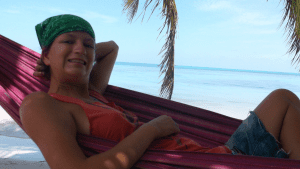
Nomad Tip: When entering a country that isn’t your own, immigration staff will want to know why you’re there and what your intentions are once you’re allowed in. In many cases, exchanging your services for accommodation is considered “work” and will require a special visa.
Save yourself some hassle by keeping it vague. Usually, letting them know you’re there for “tourism” is all they need to be satiated.
Starting Your Nomad Lifestyle: Explore Homestays
Homestays are a good option for anyone looking to really immerse themselves in the local community. In this scenario, you’ll rent a room or part of a house from a family. For a flat fee, they’ll provide you with accommodation, a set number of meals, and you’ll have the opportunity to learn a language.
Homestays are usually negotiated on a per-month basis and are typically very affordable. You can often find homestays online before you arrive, but we suggest waiting until you have your feet on the ground before trying to find homestays. This allows you to meet the family and decide if it’s a win-win opportunity for all parties involved.
Starting Your Nomad Lifestyle: Check Airbnb
While we’re somewhat on the fence about Airbnb, it’s definitely worth touching on. You can find some pretty great rentals at good prices if you are a little flexible. We often check Airbnb before we book flights if we plan to be somewhere any longer than a few days.

Pros of booking with Airbnb:
- Heavily discounted weekly and monthly rates
- Verified reviews from people who have stayed there
- Secured payment platform
- Learn about the location before you commit
- More privacy than a hotel or hostel
Cons with booking from Airbnb:
- Most bookings charge additional per person
- Cleaning fees are expensive for short-term stays
- Taxes aren’t included in the estimated price
Once you learn to use the platform to your advantage, it becomes much easier to find what you’re looking for. We’ve booked numerous well-equipped Airbnb homes in spectacular locations for less than what we’d pay for a cheap hotel room.

Nomad Tip: Be as flexible as you can be, while also being as specific as you can be. The Airbnb platform allows you to select everything you “need” in a place. If wifi is an absolute must, but you’re able to go without FiberOptics, say so. This will give you more options to choose from without weeding through places that absolutely won’t be a fit.
#2 Do: Plan One Step at a Time
We understand the importance of getting plans in place. Knowing where you’ll be and when can help you get psyched up for your impending adventure. Planning for the not-so-far-away future is exhilarating. You’ll be motivated to get rid of things you don’t need, save money, and make final arrangements.
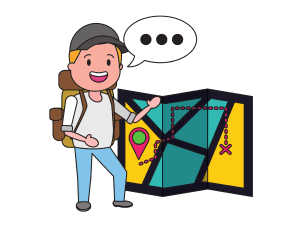
But getting stuck on the details can also backfire for some. Planning too far ahead could be your downfall. Remember, when living your new nomad lifestyle, plans can tend to change quickly – whether you like it or not.
For example, not every location is suited for everyone. A beach town might be your dream goal, but you may find that living it long-term isn’t for you. Don’t over commit and get “stuck” with something before your adventure even begins.
We’ve booked countless places sight unseen and wound up trying to make the best of a bad situation.
One time, we booked an apartment for a month, not realizing that the photos of said apartment were pre-hurricane pics – hence the too-good-to-be-true price. When we arrived at the semi-dilapidated structure we were to call home for a month, I almost cried. Now (years later), it’s a fun story to talk about!
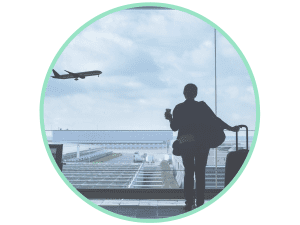
The point is, don’t get too far ahead of yourself in the initial process of starting your nomadic journey. Leave yourself open and free to make decisions as you go. Escape the go, go, go lifestyle and opt for a more fly-by-the-seat-of-your-pants attitude when it comes to making plans.
Nomad Tip: Find a place you’re interested in starting your new nomad life. Look for short-term rentals and find a place you think could be a good place to lay your head for a few weeks or a month. Take the time to explore the area and decide what you do (and don’t) like before making any long-term decisions. Then, repeat.
#3 Do: Join Location-Based Facebook Groups
One of our biggest assets as full-time nomads has been location-based Facebook groups. We’re able to get real-time answers from people who already have their feet on the ground. While expat groups tend to have a flair for the dramatic, you can still get some pretty good info.

We use Facebook groups to get leads on;
- Specific barrios (neighborhoods) we might enjoy
- Must-see attractions and which to avoid
- The best spot for “insert food item here”
- Potential short or long-term rentals
Remember, everyone has an opinion online. Take the info you receive with a grain of salt and do with it what you will.
Nomad Tip: Use the search function in Facebook. Type in broad locations like “Mexico” or more specific places like “Playa del Carmen” along with words like “Expats” or “Foreigners” to find what you’re looking for. Before you join a group, read the description, check the number of members to decide if it’s going to be a good fit for you.
Additionally, if you’re still in the planning phases of starting your nomad life, you’ll want to check any potential groups to make sure they’re “private.” Otherwise, anyone can see your posts – including co-workers, friends, and family members you might have on Facebook.
#4 Do: Get Your Feet on the Ground
The best way to save money on rentals is to get your actual feet on the ground. Once we’ve arrived at a location and have decided we’d like to stay a while, we’ll get to work finding longer-term accommodations. Once something hits the internet, the price tends to double… or even triple.
Instead, we’ll spend a few days walking around the city. This allows us to get a lay of the land while also giving us the opportunity to find potential rentals. Anytime we see a “Se Renta” sign we’ll either write the number down or simply take a picture so we can contact them later.

Another great resource for finding affordable rentals is utilizing locals. We’ll often start a conversation with a taxi driver or bartender and see if they know of anything available. If they don’t, they’ll usually know someone who knows someone that knows of something… somewhere.
Nomad Tip: Skip the expat “realtors.” We’ve known many an expat that has a side hustle as a self-appointed realtor. Essentially, you tell them what you’re looking for, and they’ll get on Facebook Marketplace, find a few options, and schedule appointments with the owners. They’ll then charge you (or, more likely, the owner) a fee for their “services.”
While it’s not exactly a scam, it is a little shady. Save yourself time and money by doing your own legwork.
#5 Do: Travel Like a Local
It makes sense that you’d want to see and explore more areas. Whether you’re looking to find your next potential destination or you just want a one-off day of playing tourist, you’ll have plenty of time to do it. And that’s good because traveling like a local can often take lots of time.

When you’re on vacation, your time is often limited. But when you’re fully nomadic, you often have nothing BUT time. That means you can take the “scenic” route from Point A to Point B. It also means you’ll be able to save a decent amount of money, connect with locals, and immerse yourself in your chosen country’s culture.
Instead of getting a costly rental car for a few weeks, try:
- Collectivos: While there’s a different name for them in every country, opting to immerse yourself in shared travel can really open up your eyes. Collective taxis, vans, or boats typically have a specific pick-up and drop-off point, but you can also flag them down as they pass as well.
Collectivos can be good for short trips to the grocery or even longer city-to-city routes. This method of travel definitely takes a bit longer but it’s cheap, fun, and good for the environment, too!
- Buses: Opting for a bus can be the ideal way to travel long distances. They’re typically more comfortable than planes, cheaper, and let you take a virtually unlimited amount of baggage. Higher-end buses even have amenities like wifi and plugs to charge your phones. So, sit back, relax, and watch the world go by!
- Opt for day rentals: If you really want to explore an area on your own, one of the best ways to do it is by renting a motorcycle, 4-wheeler, or scooter for the day. Most tourist towns (big and small) will typically offer cheap per-day vehicles you can rent to check out areas you wouldn’t be able to get to otherwise.
Although renting a vehicle isn’t common practice for locals, they often use their own to get to more off-the-beaten-path places. If tours are your thing, you can do that too, but it’ll likely cost you quite a bit more. Instead, ask for a map and follow the locals… or find your own adventure!
As nomadic-AF individuals, we’ve traveled in some pretty interesting ways. From flagging down tuk-tuks in Thailand to hitchhiking in Nicaragua, the actual process of traveling has been some of our most memorable experiences. Whether we’re meeting life-long friends, getting lost, or feeling seasick, we always seem to come out with a story to tell.
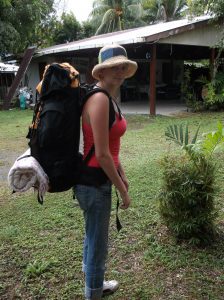
Getting off the beaten path can be rewarding as well. Ask the locals where they go to vacation and how. You’ll likely get some pretty excited friends looking to share their favorite hidden gems that won’t break the bank. And if it takes you a while to get there, who cares? You’ve got all the time in the world!
Nomad Tip: If you’re used to always having your schedule filled to the brim, it can be hard to learn to relax during long wait times. But, sometimes, doing nothing is just what the doctor ordered. Slow down and embrace the calm. Take in the scenery, watch how the locals interact, or catch up on your favorite book. Who knows, you may just transform your horizons in more ways than one.
#6 Do: Shop Like a Local
We often see people “sticking with what they know” once they hit a new location. They eat the same foods, shop at the same stores, and cook the same ways. While it is possible to get the majority of your creature comforts from home while abroad, you aren’t exactly opening your horizons.
If you truly want to immerse yourself in the culture, the best way to do so is by shopping like a local. Head to the mercado where you’ll find the latest in-season items at a much more reasonable price than you’d get at the Walmart in town. It’s funner, too!
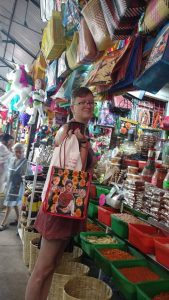
Whenever we get to a new town, one of our favorite things to do is hit the local markets. We see which fruits and veggies are unique to the area and plan meals accordingly. You can find almost (if not all) of the things you’d possibly need in a local market.
Most markets are divided into sections. You have several choices of vendors in each section. Once we find a vendor we like, we tend to stick to them, but you can always opt to try several shops until you find the perfect fit.
Sections are typically broken into:
- Fruits and Vegetables
- Poultry (including eggs)
- Beef and Pork
- Fish and Seafood (depending on the area)
- Cheese and Dairy
- Miscellaneous Items (oil, flour, canned goods, etc)
There’s also usually an area for:
- Fresh Flowers
- Clothing-Related Items
- Plasticware and Cookware
- Sweets and/or Baked Goods
- Prepared Food Stalls and Restaurants
There’s a reason locals shop the way they do. They buy for the day when produce and meats are at peak freshness. Not only is fridge and freezer space limited in most homes, but there are bugs and semi-frequent power outages to contend with, too.
Nomad Tip: Be sure to bring your own bags and lots of small bills to markets. You’ll be dealing with multiple vendors that don’t have lots of change for bigger bills. Chances are you’ll be hitting at least three individual stalls when shopping in a local market. So you can save everyone some time and energy by paying with exact change.
#7 Do: Opt for Nomad Insurance
We won’t get too deep into how important having nomad insurance is. But, if things can go wrong, they probably will. We’re big fans of SafetyWing travel insurance for a lot of reasons. They offer plans that cover everyone from full-time nomads to those who are looking to insure one-off trips.

SafetyWing is a California-based travel insurance company that provides medical coverage for both digital nomads who are working abroad and other frequent travelers. They’re pretty affordable, too.
The SafetyWing “Nomad” package is just $42/USD a month and offers benefits like:
- $250,000 in medical coverage
- $100,000 for medical evacuation
- $20,000 for repatriation
- $12,500-25,000 for dismemberment and accidental death
- $10,000 for evacuations due to political turmoil
- $6,000 for lost luggage
- $5,000 for trip interruptions
- $1,000 for dental care
- $200 for travel delays
Whichever route you decide to take for travel insurance, we do think it’s a good idea to stay covered. Having that extra cushion can be a weight off your shoulders if something ever did happen. We’re partial to SafetyWing Insurance based on the price, flexibility, and the nomad-specific packages.

(Keep in mind: Nomadic-AF is reader-supported. When you buy through links on our site, we may earn an affiliate commission (with no additional cost to you)).
Avoid These Common Mistakes When Starting Your New Nomad Life
We’re well-seasoned travelers living a fully nomadic lifestyle. But that’s not to say we haven’t made plenty of mistakes along the way. And while some of those mistakes turned out to be blessings in disguise, many of the others were just plain crappy. Happily for you, we’ve made the avoidable mistakes, so you don’t have to.
Check out the below section of things to avoid when starting your nomadic journey. Again, the right path for us isn’t necessarily the right path for you. If you feel so strongly about something that you’re willing to take risks, we say go for it. After all, what’s life without a few risks?
Having the right information (and enough of it) could be the difference between a good risk and a bad risk. Understanding the potential downfalls and going for it anyway can lead to some pretty amazing adventures. Only you can decide if you want to play it safe or hope for the best.

#1 Don’t: Buy Right Away
It’s not uncommon for us to see folks getting to a new location with the itch to buy, buy, buy. There are a few reasons for this. Some of the rationales are pretty solid, and some are somewhat shaky at best. Here are a few reasons people get the urge to immediately snatch up property when getting their feet on the ground:
- Starry Eyes – You land in a place and fall instantly in love with the town. Meanwhile, there’s a dream-worthy ocean-view condo outside of town and you decide to buy it. Months later, you’re tired of driving 30 minutes to find a grocery store. You want to move, but your money is all tied up in your new home.
- Unbelievable Prices – Your dollar goes so much further when living abroad that you may be encouraged to buy a place to call your own. You could, in theory, buy a much nicer property at a fraction of what you could in your home country. But when it comes time for the rainy season, things could start to fall apart at the seams.
- Ingrained Philosophies – While you may want to skip the rat race and avoid the 9-5, there’s still something ingrained in us that feels the need to “prove” our worth. In a first-world country, having a house and a car shows that value to the outside world. But the reality is, we don’t need any of that… at least right away.
Putting all your eggs in one basket is a common problem that could lead to problems down the line. Now that we’ve mentioned a few reasons you may be encouraged to buy a place to call your own let’s take a look at some reasons you may want to hold off for a while:
- Your location blinders fade – Maybe you loved the town when you first moved there, but the idiosyncrasies of long-term life are much different than a few days in a pretty new place.
- You’d rather save the cash – Although a home may sound like a good investment, they are often money-pits that prevent you from doing the things you want to do… like, travel.
- The house isn’t what you hoped – From noisy neighbors to new construction blocking your view, anything is possible. Who knows, maybe the realtor forgot to mention that the trash truck parks right outside your window at 6 am every morning.
One thing you never want to do when starting a nomadic lifestyle is plan too far ahead. Unless you’re looking in a highly sought-after area, chances are pretty good that if a house you like is on the market, it will stay on the market. If not, there’s a dozen others waiting to be bought up.
Nomad Tip: Even if you plan to buy within the first year, start by renting. One of two things will happen. You’ll love it or hate it. You may be happy to call the landlord with a problem rather than fixing it yourself. Conversely, you might decide the area is to your liking enough that you want to make it your forever home by buying a house.
#2 Don’t: Bring Unnecessary or Big-Ticket Items
There are a lot of reasons people might consider bringing unnecessary or big-ticket items from home. You may have furniture that you absolutely adore. Maybe your great aunt’s second cousin passed down a cabinet that you can’t bring yourself to part with. Or, perhaps you don’t think you can get said item once you land on your feet abroad.

We know that parting with certain items can be difficult. But it’s all part of your new nomadic journey. In most cases, it’ll benefit you the most if you sell or donate your household items before you travel abroad. You can save some extra cash for your trip, help someone in need, and de-clutter all at once.
If you absolutely must bring a specific item, be aware:
- It will cost you a lot of money to ship across borders.
- Expensive items can easily get lost or stolen during shipping.
- There can be a lot of moisture in the air, making certain items quickly deteriorate (especially during the rainy season and/or near the beach).
- The furniture sold in stores is usually weather-appropriate for that region.
- Most gizmos and gadgets can be acquired (or delivered) to your new place.
You wouldn’t take a fur coat to a town where bikinis rule, would you? Probably not. So, skip the bulky leather sofas when heading to a warm climate. Avoid damage to expensive electronics by keeping them far away from sand, salt water, and humidity. And most importantly, use moving abroad as an opportunity to pare down and start fresh!

Nomad Tip: For those items that have emotional value for you or items that won’t travel well, you can opt to go the storage route. Just be aware that putting things in storage can be a costly endeavor in the long run. We’ve known many, many folks who have to take trips back to their hometown to sort through storage units. And, in most cases, they’re not sure why they kept half the things they did.
#3 Don’t: Expect First-World Amenities
First-world amenities require first-world infrastructure. If you’re looking to travel and save money while doing so, you’ll likely be trading in some of your creature comforts. Living abroad generally lends to a more relaxed, easy-going lifestyle. Say goodbye to those first-world problems and embrace your new culture head-on.
When the little things become more important to you, you can relish in them all the more. Things you once took for granted, like infallible wifi, will take on a new meaning for you. A cold ice cream after a long day of no AC, for example, will never have tasted better. What you lose in first-world amenities, you gain in appreciation.

Depending on the country you’re in and the individual circumstances, you may have planned (or not-so-planned) outages, including:
- Running Tap Water
- Electricity
- Gas (cooking and hot water)
- Wifi
- Cell Service
Aside from regular outages, there are some amenities that just aren’t as common in certain countries. Hot water, for example, is not a given in warmer-weather locations. Washing machines and dryers are rarely found in apartments or houses since many locals wash clothes by hand or opt to go to the laundry.
If you’re a baker, you might be surprised to learn that a rental doesn’t have an oven. Instead, you’ll need to adapt to cooking your meals on a burner stove. Using too much electricity at once can oftentimes be a problem, too. Turn one major appliance on at a time to prevent potential problems.

You may expect there to be AC throughout a home if you’re renting on the beach but you could be wrong. Individual rooms may be the only place to take a cool down. And, there might be an extra cost even for that. That’s why it’s always important to ask what’s included before renting.
Nomad Tip: Don’t drink the water unless you’re sure it’s been filtered. If you’ve ever traveled abroad, you’ve probably seen the big 20 liter garafons of water. You should always use that or bottled water to drink, brush your teeth, and even cook with. Drinking water is a first-world amenity that many, many countries don’t realize that they have.
#4 Don’t: Get Sucked into Every Cause
There are a lot of needy people out there. It can sometimes feel overwhelming seeing so many families in need, topped by women’s issues, and animal welfare, there’s just too much for one person to take on. Every cause has merit, but at the same time, you can’t help everyone all on your own.
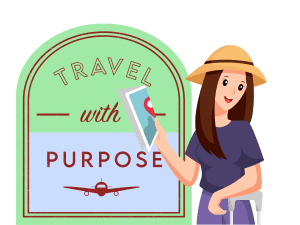
Helping someone can sometimes lead to getting taken advantage of. Oftentimes, that’s caused by a lack of understanding. For instance, I had a woman ask me once “why I didn’t just get money out of the machine” when I needed it. She legitimately thought white folks like me could go to the ATM and get any amount of money, for any reason.
Misinformation isn’t the only cause of strife. Privilege (like growing up with good schools and food on the table) comes with many perks, but it can also put a target on your back. Scammers are out there, ready, and willing to take a few bucks off the hands of people who “don’t really need it.”
Of course, that’s not true in all instances. But it’s definitely worth mentioning that you should pick and choose what causes you want to take on and which might not be worthy of your time or money. A little research and due diligence on your part can help determine where your help will be needed the most.
Nomad Tip: Don’t end up overwhelmed or jaded with a location based on poverty, animal welfare, or other causes dear to your heart. Do what you can do, and try not to stress about the rest. Trust us, people will notice and the community will appreciate anything you can do.
#5 Don’t: Expect a Perpetual Vacation
Living a new nomad lifestyle allows you to see the world in a new light. It’s entirely different from being on a perpetual vacation – as it should be! Finding the right balance is key. You don’t want to get burned out on the party lifestyle, yet you don’t necessarily want to sit on the couch all day every day either.
The best way to find an even balance is through creating a life based on what you like to do. If you’re passionate about cooking, find like-minded people to shop and cook with. If you prefer relaxing with a book, join a book club to fill your day. If you’re into outdoorsy things, look for a nature club that goes on weekly hikes or opt for a sunrise paddleboard.

We really like the slow travel lifestyle, too. It lets us get a feel for the location, meet fellow travelers, and truly immerse ourselves in the culture. We don’t need to rush to do certain things and we’re not pressured to be out-and-about because we have plenty of time to do them as we see fit. If we get itchy feet, off we go!
Nomad Tip: Don’t do too much, too soon. Adjusting to a new nomad lifestyle can be both physically and emotionally challenging. Get settled, breathe, and then explore at will! Remember, on a vacation, you need to pack in as many adventures as you can while you can. As a nomad, you have nothing but time. The ruins, museum, and ocean will be waiting when you’re ready.
#6 Don’t: Underestimate Problems Arising
From Mother Nature to health issues, the fun never ends when living the nomad life. If something can go wrong, it probably will. At least, that seems to be true with our luck! We’ve been through terrifying hurricanes, pickpockets, health scares, and so much more. All you can do is prepare for the worst and hope for the best.

You can only prepare for so much. For example, during the pandemic we had several friends that were holed-up in hotel rooms across the globe unable to leave. The countries they were in locked down virtually overnight leaving our friends stuck for months not knowing when they’d be able to move on.
We’ve been through a lot of problems, both big and small. Sometimes, a good attitude and a little luck can be all you need to turn a situation around. Other times, you just need to take the hit and move on. In the end, what doesn’t break you (or your spirit) really does make you a stronger, more knowledgeable traveler.
Nomad Tip: Reset your brain before long-term travel. Put yourself in different situations before you even get on the plane. Take a different route to work, try a new restaurant, or experience something new for the first time. These situations will help you learn to adapt and (hopefully) conquer things outside your typical day-to-day routine.
Escape the Rat Race and Start Your Nomad Lifestyle Today!

Don’t let anyone fool you! Long-term travel isn’t easy. But it is possible. Not just for the wealthy, not just for the young, and not just for the college-educated. Anyone with nearly any budget can enjoy a nomad lifestyle if they put their mind to it.
Everyone is different, and that’s okay! There are countless ways to travel and countless ways to make it work for your individual circumstances. Whether you’re living out of a backpack or living in the lap of luxury, there’s no way to travel wrong. So stop talking about escaping the rat race and start making actionable plans to implement your nomad lifestyle today! The world is waiting for you, but it won’t wait forever.

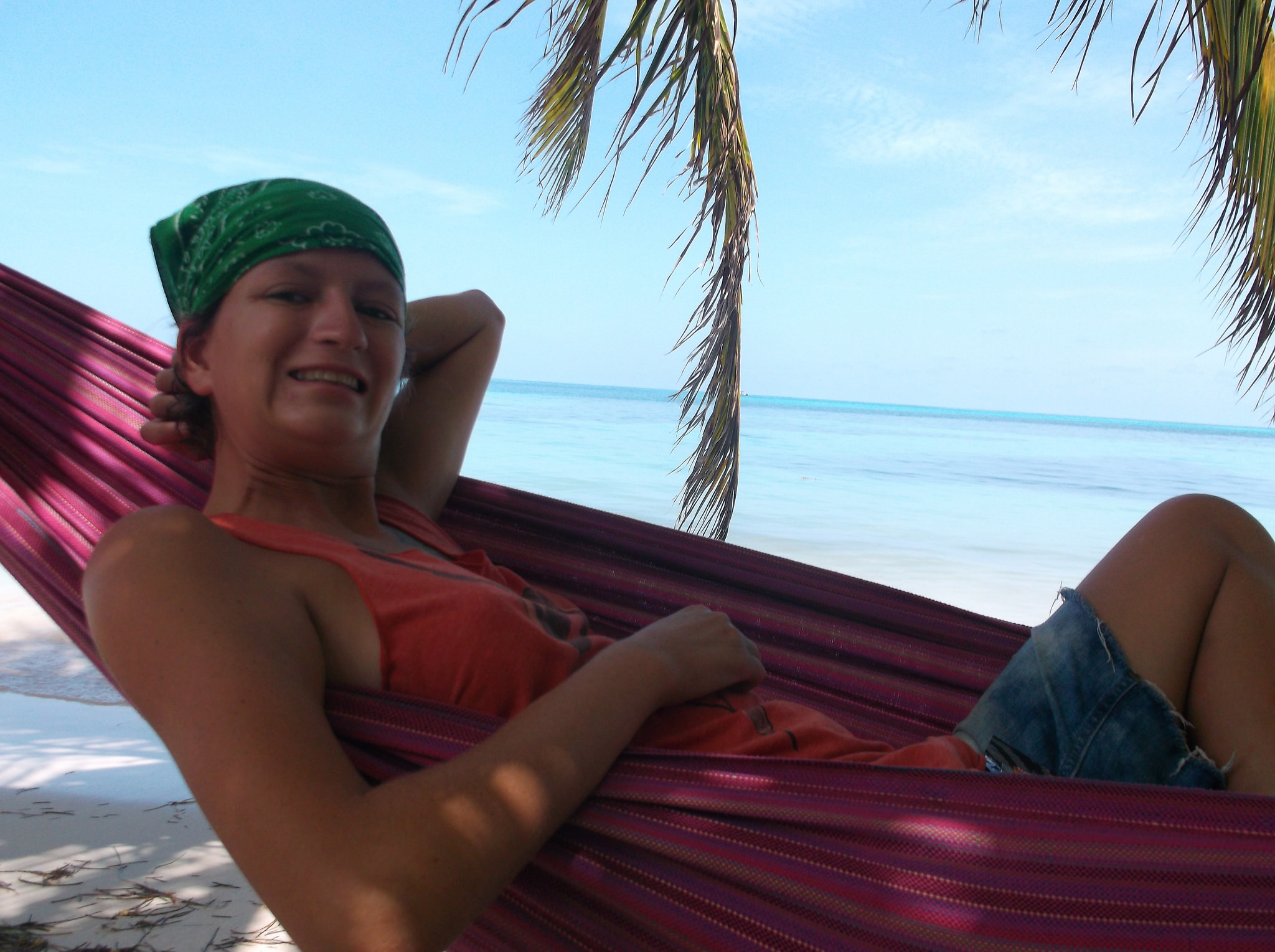
Natasha Moore is a professional SEO content writer and owner of Word Brokers, LLC. She enjoys traveling, hanging out with pups of all sorts, and reading the biggest books she can find. She’s also a full-time digital nomad, and you can find her writing content from the beach in Mexico, a corner coffee shop in Colombia, or lounging by the lake in Guatemala.


